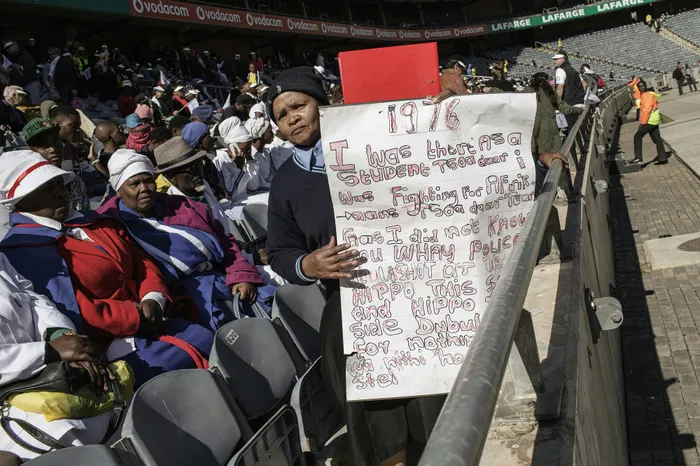ANC’s Tiptoeing on Afrikaans an Insult to the 1976 Generation

A SURVIVOR of the June 1976 uprising holds a placard as worshippers attend a religious service at the Orlando Stadium in Soweto on June 11, 2016 to commemorate the 40th anniversary of the Soweto uprising. The apartheid government, which forced black citizens to speak Afrikaans, continues to live in our democracy by imposing this language of racism and oppressive rule, says the writer. Picture: GIANLUIGI GUERCIA / AFP)
Edwin Naidu
LEST our leaders forget, on 16 June 1976, between 176 and 700 youth were killed during the Soweto uprising over the introduction of Afrikaans as a medium of instruction at schools in the township.
Over 20,000 learners took to the streets to oppose the “language of the oppressor”.
While the focus fell on the outrage over police brutality, highlighted by the death of Hector Pieterson, through the iconic photo by Sam Nzima, the opposition to Afrikaans got lost in the turmoil.
Thirty years into democracy, South Africans remember the struggles of the youth against apartheid oppression. However, the memories of the reasons behind their protest have escaped many.
It refers to the democratically elected ruling party, the ANC, which seems to delight in remembering occasions like Soweto Day with grandiose speeches and a commitment to a better life for all.
Why, then, it must be asked, does this same ANC, now ruling in a coalition through a Government of National Unity, still pandering to the “language of the oppressor”?
The very Constitution that gave birth to 12 official languages: Sepedi, Sesotho, Setswana, siSwati, Tshivenda, Xitsonga, Afrikaans, English, isiNdebele, isiXhosa, isiZulu and, since 2023, South African Sign Language (SASL).
For centuries, South Africa’s official languages were European Dutch, English, and Afrikaans—while African languages, spoken by at least 80% of the people, were ignored. In 1996, a new constitution protected all the country’s major languages. However, that protection appears to go no further than ensuring the status of English, the official business language in South Africa, Africa, and globally. In South Africa, Afrikaans has thrived under democracy, which is essential for a minority of speakers.
The apartheid government, which forced black citizens to speak Afrikaans, continued to live in democracy by continuing to impose this language of racism and oppressive rule in a democracy.
How is it possible that the same constitution, meant to ensure the rights of all, continues to favour a chosen few?
Does it suggest that the Sunset Clause during negotiations, which guaranteed white civil servants a stake in the new South Africa and helped break the deadlock in the negotiations, has ensured a peaceful transition with the former masters continuing to have it their way?
Afrikaans is still compulsory despite the efforts of those brave young children who gave their lives fighting against the language of the oppressor. To highlight its ridiculousness, everyone gets a public celebration on June 16 while the fight continues.
Why is Afrikaans compulsory at schools? If the Constitution protects the language, that is all well and good and does not stop Afriforum, the Democratic Alliance, or Freedom Front Plus from speaking in their taal. But surely, in a democracy, the language of the oppressor should not be used as a tool to continue the oppression from which many have not escaped, being mired in poverty and unemployment.
What about other indigenous languages? Do they get the same treatment? Rather than continue to bend over backwards for white minority groups to get their way persistently, the government should question whether South Africa would benefit from having English as the official language. This would eliminate uncertainty, remove bias against other marginalised languages, promote social cohesion, and go a long way toward healing the wounds of the past.
What good is democracy when the liberation movement continues to silently watch as the people it fought for continue to have their rights trampled on by minority groups like Afriforum and the DA? Previously, one viewed the DA as a party of change, embracing black leaders, but subsequently discarded it as the white monopoly over the party intensified.
Afriforum and the DA care little about ALL South Africans. That is obvious. The ANC pretends to care for all citizens. But it shows it through derisory grants, creating a culture of dependency instead of nurturing citizens who can become winners.
If English was adopted as the official language of communication while protecting the other languages equally, South Africans could speak with one voice.
Thirty years later, it is time for conversation on The Future South Africa we Want and Deserve. That future should take cognizance of what citizens want rather than politicians and minority rights groups imposing their will on a silent majority.
One would expect more from the ANC on the ongoing disputes with Afriforum, the Freedom Front Plus and the DA over language and policy in the Basic Education Laws Amendment Act (BELA). They argue for the same mother tongue instruction, which most citizens had no choice but to accept with bullets and batons in 1976.
One hopes that the ANC stands firm on the language issue and the threats by Afriforum, the DA and FF+ to go to court or to pull out of the GNU.
The battle for South Africa is far more pressing than the battle for Afrikaans – the language of the oppressor that continues to be rammed down the throats of citizens in a democracy.
Otherwise, it means that Hector Pieterson and hundreds of others died in vain so that Afriforum, DA, and FF+ could continue to manipulate democracy through the “language of the oppressor”.
Indeed, they are free to set up camp in Orania!
* Edwin Naidu is a communications specialist and heads social enterprise start-up Higher Education Media.This article is republished from Naidu’s blog on Higher Education Media.
** The views expressed in this article do not necessarily reflect the views of The African.